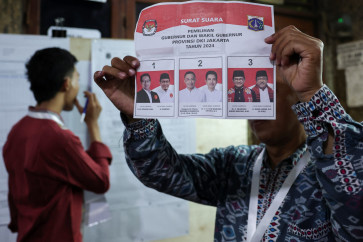Popular Reads
Top Results
Can't find what you're looking for?
View all search resultsPopular Reads
Top Results
Can't find what you're looking for?
View all search resultsGovt expands nuclear monitoring at major ports
More radiation portal monitors (RPM) will be installed at the nation’s major seaports to follow up on proposals made by President Susilo Bambang Yudhoyono, an official says
Change text size
Gift Premium Articles
to Anyone
M
ore radiation portal monitors (RPM) will be installed at the nation’s major seaports to follow up on proposals made by President Susilo Bambang Yudhoyono, an official says.
At the 2012 Nuclear Security Summit in Seoul, South Korea, last month, Yudhoyono proposed that nations enact regulations to promote nuclear nonproliferation and peaceful nuclear energy use, according to Nuclear Energy Regulatory Agency (Bapeten) head As Natio Lasman.
Only four major ports currently had the devices, he said: Tanjung Priok Port in Jakarta, Tanjung Perak Port in Surabaya, East Java; Batam Port in Batam, Riau Islands; Belawan Port, North Sumatra.
“After the successful test of the RPM at Belawan Port in Medan, North Sumatra, earlier this year, we are eyeing more ports in the near future,” As Natio said.
Priority would be given to large ports with significant export-import volumes, such as Makassar Port in Makassar, South Sulawesi and Tanjung Emas Port in Semarang, Central Java.
The International Atomic Energy Agency (IAEA) helped to instal the RPM in Belawan as part of implementing the US-backed EXBS (Export Control and Border Security) Program, he added.
Indonesia received the assistance after attending the first Nuclear Security Summit in Washington in 2010.
An RPM is a sophisticated device that can detect radiological materials in cargo containers and vehicles and on individuals.
Local customs officials are in charge of operating the devices.
“Customs officers will hold any shipments identified to be containing suspicious radiation sources or nuclear materials and report them to Bapeten. We will then take all required measures on the materials before deciding to issue a clearance,” As Natio said.
Bapeten began testing its radioactive-source tracking system in November, allowing officials to detect radioactive materials and their movement in real time.
“This is a mobile system, so it can effectively prevent illegal nuclear material from entering the country,” Lasman said.
Bapeten expected that the government would earmark more funds in the 2013 state budget for the agency to buy more RPMs, he said.
He said that the government would not be lenient with individuals who were involved in shipping illicit nuclear material.
As Natio said that the agency had experience working with a local company that was shipping nuclear material. “Bapeten worked with the police to force the firm collect all the contaminated materials. The firm also had to take responsibility to treat any civilians who suffered from contamination.”
As Natio, however, said that the agency had never recorded any smuggling of nuclear material in Indonesia.
At this year’s Nuclear Security Summit, Foreign Minister Marty Natalegawa said that participants had welcomed Indonesia’s initiatives on intensifying nuclear monitoring.
“The world has seen this important effort as part of efforts to prevent the fall of nuclear energy in the hands of terrorists,” he said. “This portal monitor will help keep our nation and the world secure.”
According to the IAEA, there were 1,340 reported smuggling attempts of nuclear and radiological materials around the world between 1993 and 2007.










